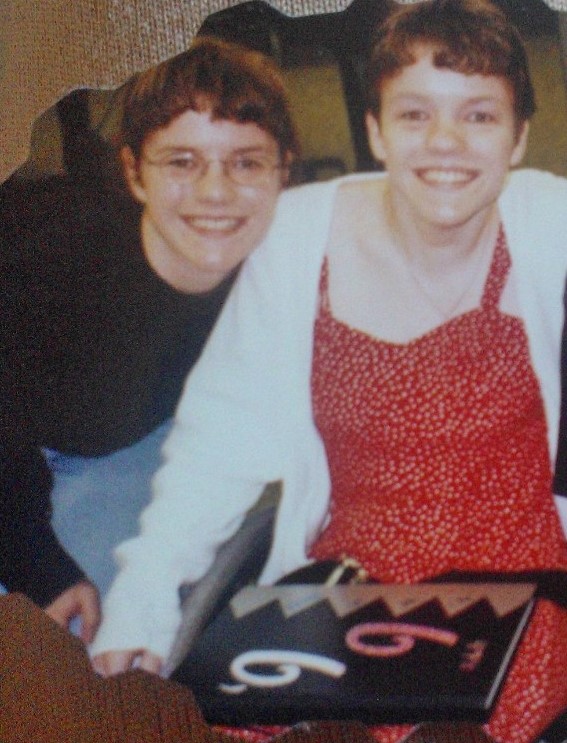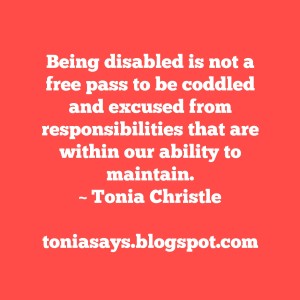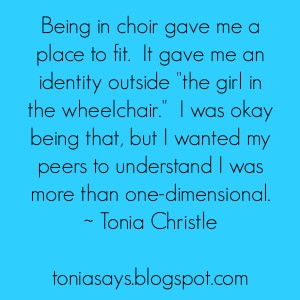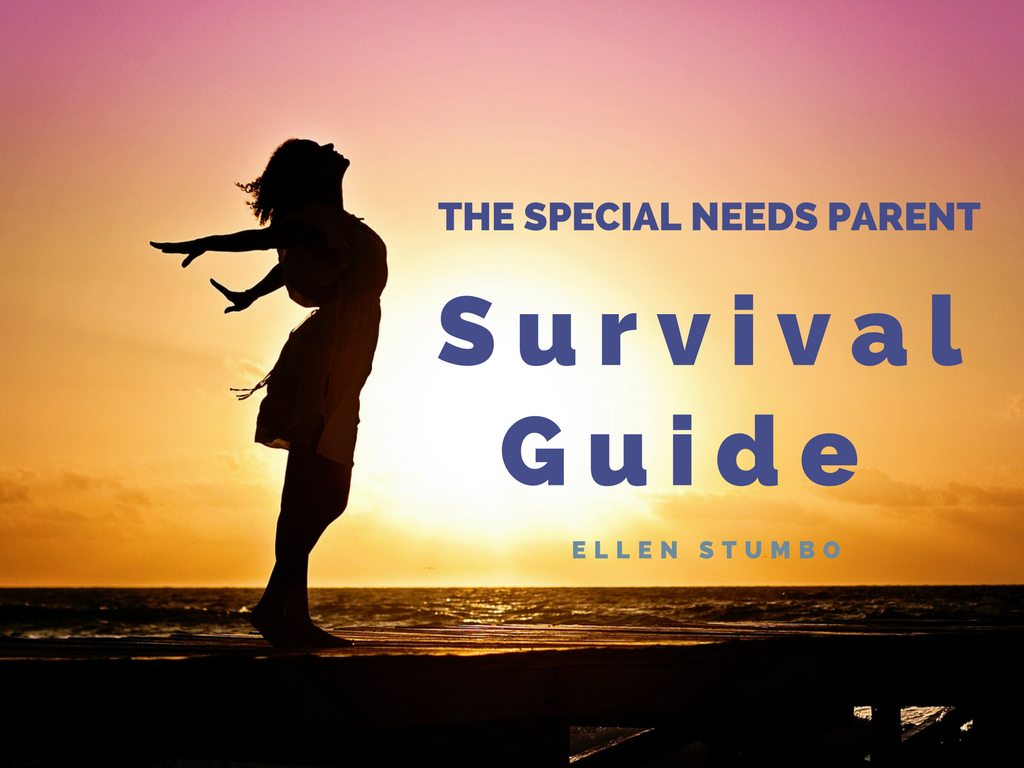Editor’s note: This is a guest post by Tonia Christle from Tonia Says for a blog series titled “Growing Up With a Disability.”
This may come as a shock, but high school was actually a great experience for me. This is due – in no small part – to some key moments and ways my parents guided me along the way. Some were small, but made a huge impact when the right comment was made in the right moment. Others were forged out of necessity – of trying to put one foot in front of the other in the midst of trauma. And others still were borne of my parents not being afraid to steer me away from something that they knew wouldn’t work with my CP, and toward something that would.

If you have enjoyed my previous posts, The Early Years, The Elementary Years and The Middle School Years, get ready for this installment. And if you are the parent of a disabled high school student, this post is for you.
BUILDING SELF ESTEEM AND CONFIDENCE:
One of the very best things my mom ever did for my self esteem and confidence is a moment that passed so quickly she has likely forgotten it. But just as negative remarks stick in the heads of disabled kids, so too, do the positive ones.
Whether I wanted to admit it or not, much of my self esteem (or lack thereof) came from the understanding that my body didn’t do what most of the other kids’ did. So, relatively easy things became significantly harder for me.
Living in the land of 10,000 lakes, it followed that from time to time, my family took the boat out onto the lake. I enjoyed it. What I didn’t enjoy was the process of getting into the boat. This meant putting my crutches in the boat and then somehow figuring out how to maneuver unassisted from a flimsy dock, over a gap, up over the edge of the boat, and into it.
This feat was easy enough for my dad, and my younger brothers. My sister could even manage if given a hand for balance, and likewise, with my mom. At 15, though, I was too big to lift and carry. I had to figure out a way to get into that boat. My mom held off getting in and spotted me from the dock while Dad did the same from inside the boat.
Somehow, I got one leg up onto the lip of the boat, and after a lot of struggling, the other followed suit. My entire lower half was tense and ramrod straight as I lay awkwardly on the flat narrow expanse, trying to will my spasticity to let up so I could move my legs and get in.
My mom encouraged me from her place on the dock, “Go, Shannon!” she said. “Go, Shannon! Go, Shannon!” The significance of the name my mom used in that moment was not lost on me. Earlier that summer, my sister, my mom and I had all watched the 1996 Olympic gymnastics team win the gold medal for the first time ever. Shannon Miller, the most decorated American gymnast at the time, was known as the queen of the balance beam, commanding the apparatus with grace, strength and confidence.
I laughed, hearing my mom’s name for me, and knowing that of course, I was the farthest thing from a gymnast. My spasticity kicked in a little stronger, but in a few seconds I was able to shift myself so that I landed, feet first, in the boat. It made me feel great that my mom knew I could do this and encouraged me in a way that resonated. She saw me as strong and confident like Shannon Miller, so that’s what she called me.
I’ve never forgotten it.
MAINTAINING EXPECTATIONS:
 Though my Cerebral Palsy impacted everything I did, even in high school, it was never my sole focus. I had the same concerns as other kids. I went to football games and school plays. I focused hard on getting good grades and was devastated bringing home a C. I spent most weekends helping my sister babysit our new baby brother.
Though my Cerebral Palsy impacted everything I did, even in high school, it was never my sole focus. I had the same concerns as other kids. I went to football games and school plays. I focused hard on getting good grades and was devastated bringing home a C. I spent most weekends helping my sister babysit our new baby brother.
Family and academics were really what it was all about for me. So, in the midst of junior year, when my sister had a medical emergency, none of us were expecting it. We didn’t know what to do or how to cope. In those moments of shock and trauma, my parents did some great things for me. They asked if I wanted to come and wait at the hospital and when I said I didn’t, they respected that. They never once made me feel guilty for doing what was right for me in that moment.
That experience changed everything. It meant that, for the first time in my life, I wasn’t going to be able to rely on Tara to push me into school in the mornings. I had to take responsibility to get myself places quickly in the months she was absent from school. I not only had to make sure I made it to classes on time, but I volunteered to get Tara’s classwork.
My parents didn’t pressure me to do this whatsoever, but they allowed me to make my own decisions. Early on, they always brought me to and from the hospital to visit, and I even got to spend the night on Christmas Eve. I always had my wheelchair and crutches with me when I was there and I was allowed to stay all day long during winter vacation.
There was never a sense of pity or a fear that perhaps too much was being placed on my shoulders. On the contrary, my parents believed that I was capable of doing all these things. I was never shielded from the reality of what was going on with my sister. I was never kept from visiting her because hauling the chair back and forth was too much for them. I was never not expected to have my schoolwork done (though I’m sure if I hadn’t, they would have understood.) It was so good for me to feel my parents’ belief in what I could do. I’m grateful they didn’t coddle me or get me someone else to help me in the way my sister had.
I was sixteen at the time, and I was treated as such.
FINDING A TEAM:
The single most defining and positive aspect of my high school experience was singing in the choir. Living with CP there are just some things that aren’t realistic for me to do, and playing sports is one, but being in choir gave me the same feeling: like I was a part of something, and like I could legitimately contribute.
My mom played a big part in my being in choir in high school. Several years back, while signing up for classes in middle school, I was convinced I wanted to play the flute. My mom (having played clarinet herself in school) recognized the coordination and breath control it would take for me to play the flute – not to mention the posture – and suggested choir. I remember balking. I was shy at ten and said I didn’t want to sing by myself in front of people. Mom explained I wouldn’t be by myself, I would be singing at the same time as a lot of other kids.
Needless to say, by the time I was in ninth grade, I had three years experience in middle school choir. Gone was my apprehension to sing, knowing that in choir, the goal was to blend. The one drawback for me in high school choir was that I didn’t progress through the levels of (varsity, treble and concert) at the same rate as my sister. As a freshman, I made it into varsity choir, while Tara bypassed that and went straight to treble choir. We were together in treble choir as sophomores, but before junior year, it was tryout time, to see which of us would advance to concert choir and which would not. Again, Tara moved on to concert choir while I remained in treble choir for another year.
This was the most crushing thing to me. I had the same skill set as my sister. I could sight read about as well. I had a solid range. I knew how to blend. Knowing how upset I was, Tara diplomatically approached our concert choir director to ask him why she had advanced while I had not. He told her there were some basic things I was lacking, like breath control and breath support.
 Thinking back on this now, I remember in a mandatory public speaking class, my nerves had gotten the better of me. Instead of my natural speaking voice I suddenly had a severe vocal tremor I couldn’t control, felt constantly breathless and delivered my speech in a gutteral, unnaturally low voice. Once the speech was completed, I was fine. My natural prosody and pitch returned. I was embarrassed by the weird thing my voice did, and even more so when the teacher asked me, once class was dismissed, if what happened to my voice had to do with my CP.
Thinking back on this now, I remember in a mandatory public speaking class, my nerves had gotten the better of me. Instead of my natural speaking voice I suddenly had a severe vocal tremor I couldn’t control, felt constantly breathless and delivered my speech in a gutteral, unnaturally low voice. Once the speech was completed, I was fine. My natural prosody and pitch returned. I was embarrassed by the weird thing my voice did, and even more so when the teacher asked me, once class was dismissed, if what happened to my voice had to do with my CP.
In the same way, I wonder if my not getting into concert choir when my sister did had to do with the fact that when I get nervous enough, other parts of me tense up, not just my legs. Breathing was something I had always struggled with. Even in conversation, or while reading aloud, I keep going until I literally run out of breath. If it remains this much of an issue for me to breathe in casual circumstances, put me in the extra stressful situation of auditioning for concert choir and any prayer at breath control or support probably went out the window.
I did make concert choir as a senior, so Tara and I were reunited, and concert choir was the most amazing experience of my life. Our director was fantastic, and there was nothing quite like working on a piece and just nailing it in rehearsal. We were responsible to ourselves and each other. We cared about the music. We respected the teacher.
For someone who never played on a team in high school, it sure felt like I did. Being in choir gave me a place to fit. It gave me an identity outside “the girl in the wheelchair.” I was okay being that, but I wanted my peers to understand I was more than one-dimensional. Choir gave me a place to land, and it gave the other kids a chance to see me in another context. It’s been years, and there is still nothing that’s compared to being a part of high school choir.
FINAL THOUGHTS:
Parents of disabled high school students, I cannot stress enough the importance of these aspects of my high school career that my parents had a hand in:
If you want to make our day, encourage us by comparing us to somebody we admire and respect. Your teenager doesn’t have to actually be on the balance beam to get a comparison to Shannon Miller, what will matter is that you see us as just as capable as that person we look up to.
Understand that we will face difficult things that have nothing to do with our disability when we are in high school. When that happens, it’s important for us to know that you, the parent, will respect what we need in a given moment, while also maintaining expectations for us. Being disabled is not a free pass to be coddled and excused from responsibilities that are within our ability to maintain.
Finally, help us find a place to belong in high school. Pay attention to things that we show a natural aptitude for, or at least, enjoy. Encourage us to take classes in high school that give us another identity outside of “the disabled kid.” Don’t be afraid to steer us away from things we are absolutely not suited for. We don’t know everything about ourselves growing up, and we definitely need your guidance regarding what we will excel in.
“…It would absolutely change my life because all of a sudden I could be the girl who sang and did shows and I wouldn’t have to be the girl in the wheelchair.” – Ali Stroker
***
 Tonia is a 30-something woman passionate about bridging the gap between disabled adults and parents of disabled children. She is also passionate about seeing a respectful representation of disability in the media. She blogs at Tonia Says, and you can best reach her at Tonia Says on Facebook.
Tonia is a 30-something woman passionate about bridging the gap between disabled adults and parents of disabled children. She is also passionate about seeing a respectful representation of disability in the media. She blogs at Tonia Says, and you can best reach her at Tonia Says on Facebook.
Special Needs Parents, Are You Surviving?
I created a guide with 13 practical ways to help you find peace in the midst of chaos, opt in to make sure you get a copy of this freebie!



Loved this post too! Your reflections are so insightful. I think my favorite part of this was the “Go, Shannon!” section. 🙂 It’s so true that sometimes the little comments are the most memorable.
The experience related to your sister’s stay in the hospital sounds like it was difficult, but I’m so glad that your family believed in you during that time and that you realized how independent you could be.
I had a particular experience in high school that helped me realize my own capabilities as well. I used to go to school with two crutches and I couldn’t imagine going without them, until one day, we were in a rush, and somehow I left the house with only one. When I realized my mistake, I was nearly in tears, because the thought of navigating the crowded halls with only one crutch was terrifying to me – I was SURE that I was going to fall. But my mom refused to go home and get my other crutch (She said something like, “I think you’ll be fine with just one, and if not, call me later and I’ll bring it for you…but I want you to try this”). One of my brothers graciously shouldered my backpack for me for the day so that I’d have less weight to carry (one of the benefits of having the same class schedule!) but I DID IT. That experience was so scary, but I am so glad that my mom believed in me and knew that she could push me a little without it being unsafe. These “sink-or-swim” situations are difficult, but I think oftentimes they show us how capable we are of dealing with adversity. That being said, I hope you don’t take this comparison the wrong way — I realize that having a sister in the hospital is a heck of a lot more stressful than accidentally forgetting a crutch!
Also — I already told you this, but I love that you joined choir!! So cool! I totally get the “tensing up when nervous” thing, though – that’s frustrating. I’m glad you made concert choir eventually, and I’m happy that you didn’t let your initial experiences keep from trying again!
Great final thoughts, too. I’m really going to miss these posts! Thank you, Tonia and Ellen!
I loved the “Go, Shannon!” part as well. A lot of these things, I’d forgotten as the years passed and that was one I was so happy to remember again. 🙂
Definitely! No coddling by my parents (in the best way.) It meant a lot that they let me deal the way I needed to during that time.
Oh gosh, the one-crutch situation makes me nervous just thinking about it! I’m glad it turned out okay for you.
LOVED choir <3 And will absolutely miss your kind, long comments! Thank you so much!